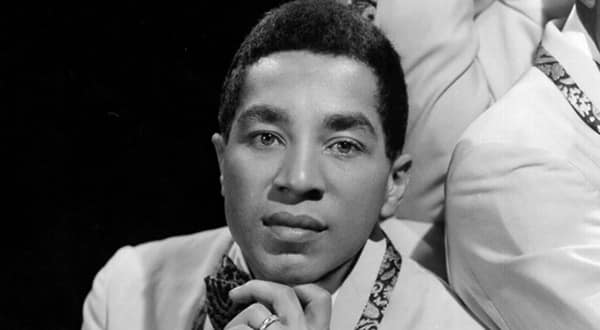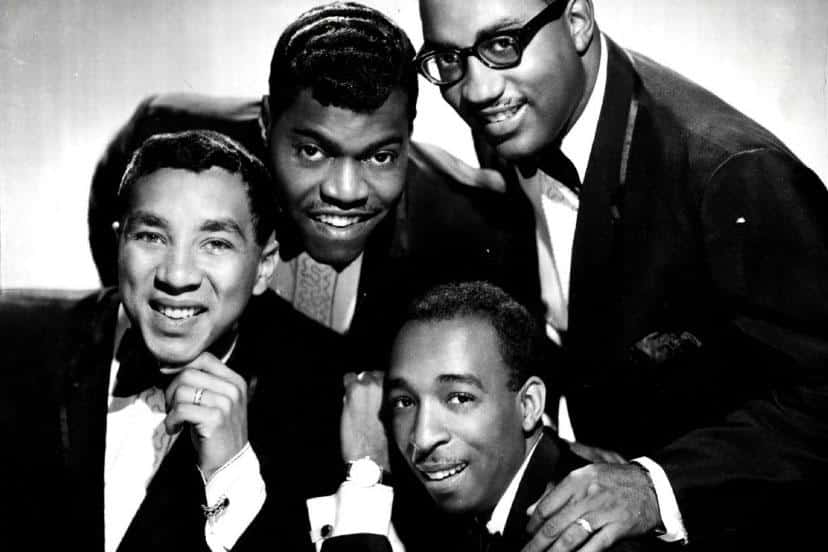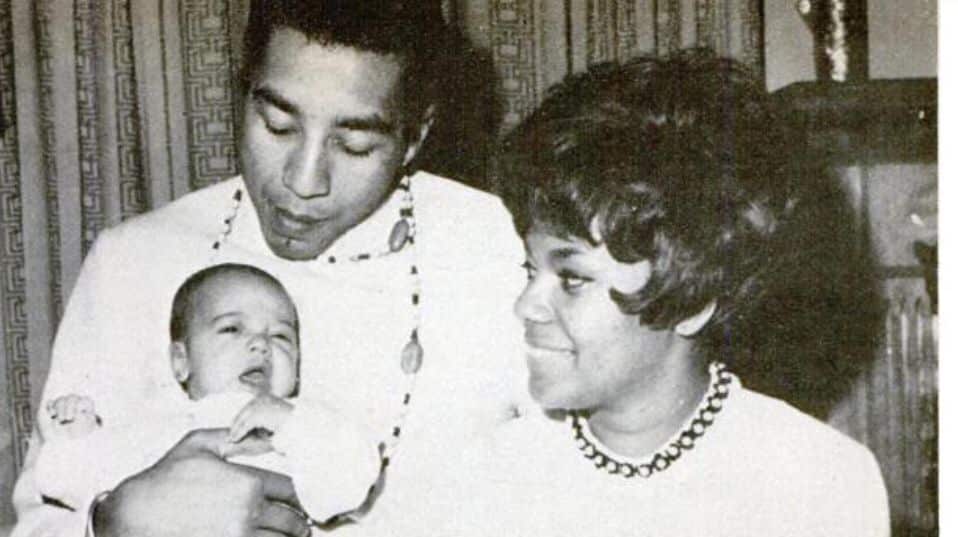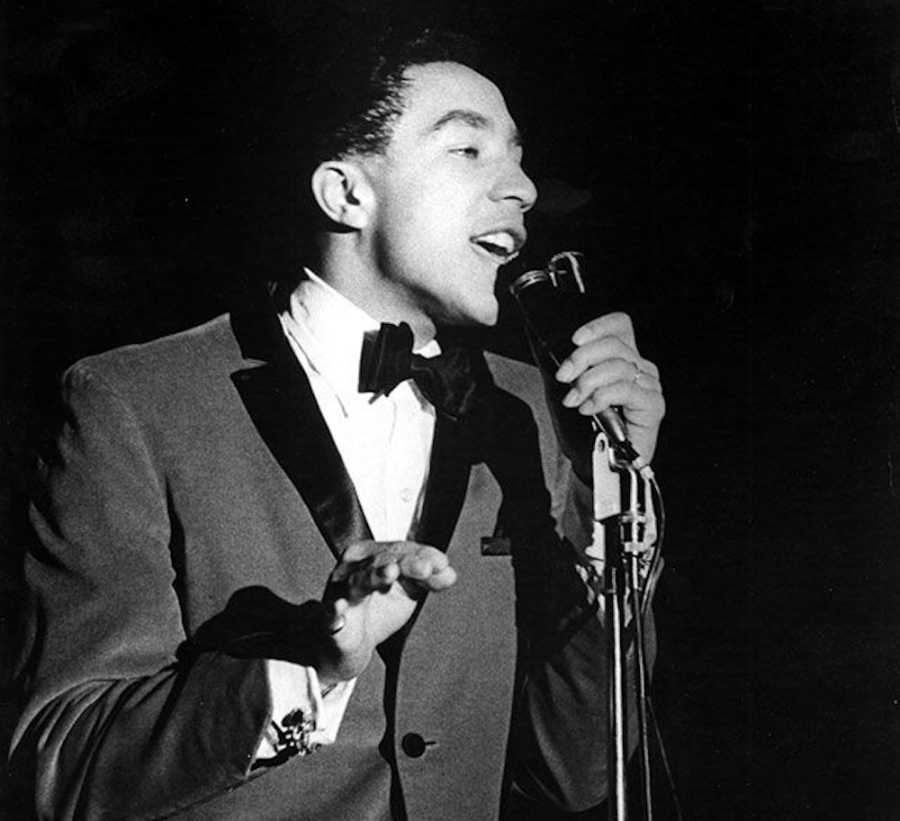One of the first popular songwriters to receive serious critical attention, he has influenced many lyricists and is often described as a master of the romantic ballad. Robinson’s lyrics express a humanistic philosophy and a faith in the power of love. He is renowned for his ability to create compelling metaphors and similes from simple language and is especially popular with critics and listeners who find his romanticism appealing in an era of increasingly unromantic, sexually-oriented popular songs.
The Miracles’ Shop Around
The early records bore all the traces of Smokey’s love of doo-wop. Their tight vocal harmonies and Smokey’s high searing lead soon evolved into a unique style. Many thought that Smokey was a woman. This misconception was reinforced during one tour when Smokey was hospitalized in Washington DC with Asian flu and The Miracles continued with Claudette singing his lead parts. Recuperating in Detroit, Smokey called Berry Gordy on the telephone and said: ‘Hey, man, they are loving you in Georgia … They think Smokey’s a girl!’
As Smokey matured as a songwriter the group found its own unique voice. His love songs are complex, particularly around questions of gender. He drew on the things he learned from his mother. ‘Mama taught in proverbs, parables and poetry’, he remembered. Through his mother’s voice he developed sensitivity to a woman’s point of view, which resonates through many of these songs. Motown as a working environment was – if not feminist – still open to women at all levels. ‘Berry … believed in women, not just as secretaries, but as executives’, remembered Smokey. ‘His first two vice presidents were women, Raynoma and Loucye. Through the years women played a major role in running the company.’
Essential to The Miracles’ musical development was their relationship with guitarist Marv Tarplin. Smokey met Tarplin through a young singer from the neighbourhood called Diana Ross. He agreed to introduce her to Berry Gordy if he could use her guitarist. Tarplin possessed a style that was mellow and percussive but packed a funky punch. Together they composed tunes like I Like it Like That and Tracks of My Tears, and gave black music a new shape, combining soul poetry with subtle rhythmic accompaniment. Also, Tarplin’s guitar sound gave Smokey’s lyrics a unique counterpoint expressed particularly in Tracks of My Tears, which reached Number 2 on the Billboard R&B Chart in 1965.
Tracks of My Tears
Ruined love is marked on the face of the song’s protagonist, worn by a freshet of tears, but the gendering of the male protagonist isn’t fixed. When Smokey sings ‘my smile is my make-up I wear since my break up with you’, the character in the song is gendered ambiguously. Smokey also recounts in his biography encountering homophobia. One specific case took place in a tailor shop in Philadelphia. A man recognized the singer and proclaimed loudly to everyone in the shop: ‘I think he’s a faggot. With a voice like that, he’s got to be a faggot.’ A violent confrontation was provoked, which left Smokey feeling ‘foolish for fighting for my manhood’.
By the mid-’60 s the band became Smokey Robinson and The Miracles in recognition of its leader’s gift. Smokey’s ability as a songwriter now overshadowed that of his mentor, Berry Gordy. Smokey wrote hit after hit for The Temptations, including It’s Growing, The Way You Do the Things You Do, Get Ready, Ain’t too Proud to Beg, Since I Lost My Baby and the epic My Girl, which was penned while The Temptations and The Miracles were playing a week at the Apollo Theatre in New York City. He also wrote tunes for Marvin Gaye, Mary Wells, The Four Tops and The Supremes. Gordy acknowledged his contribution by making him vice-president of Motown.
By 1969 Smokey was tired of touring and wanted to leave The Miracles. It took him another three years to create the right conditions for his departure. After a short recording hiatus he started a solo career. By now the industry had changed. Motown had been built in an era when the producer was king, but by the 1970s it was the age of the artist. Marvin Gaye’s album What’s Going On and Stevie Wonder’s Talkin Book signalled this shift. Smokey struggled to find his place in this new world. He turned his attention to his abiding theme: love. The result was a series of stunning adult soul records, the best of which is A Quiet Storm, released in 1975. The record combined Marv Tarplin’s atmospheric guitar with fables of love at the dark end of the street.
In her book All About Loving (2000), bell hooks argues that all forms of oppression destroy love – patriarchy, domestic violence, racism and class exploitation. She recalls Eric Fromm, who wrote in The Art of Loving: ‘the principle underlying capitalistic society and the principle of love are incompatible’. We need look no further than Martin Scorsese’s portrait of narcotic capitalism in The Wolf of Wall Street – and Jordan Belfort’s nihilistic emotional life – for confirmation of Fromm’s diagnosis. Like Mary Evans, she is sceptical of the confinements for women of patriarchal romance.
At the same time bell hooks makes an impassioned case for holding to a love ethic, one that is inspired equally by Martin Luther King’s sermons and feminist commitments. She writes, ‘Love is action, a participatory emotion’, ‘Trust is the heartbeat of genuine love’ and ‘To love fully and deeply puts us at risk. When we love we are changed utterly.’ These aphorisms read to me like Smokey Robinson lyrics; they are – I would suggest – in the same affective and political key.
In one passage bell hooks recounts an encounter with female rapper Lil’ Kim, who she had agreed to interview: ‘I found it fascinating that she [Kim] had no interest in love. While she spoke articulately about the lack of love in her life, the topic that most galvanized her attention was making money.’ The rejection of love and the embrace of material wealth is the flip-side of the commodification of romance. Both impulses damage love’s redeeming and healing potential.
The art of loving advocated by hooks is not confined to one person alone; rather, it is also circulated and routed within wider communities. Her conclusion offers a bold new vision: ‘No matter how hard or terrible our lot in life, to choose against lovelessness – to choose love – we can listen to the voices of hope that speak to us, that speak to our hearts – the voices of angels.’ Then, in my mind, I hear the languid melodies of Marv Tarplin’s guitar, and Smokey Robinson sings in his high falsetto, ‘I second that emotion’.
References
Evans, M (2003) Love: An Unromantic Discussion, Cambridge: Polity Press.
Google ScholarOpenURL Atlanta University Center
hooks bell (2000) All About Loving: New Visions, London: The Women’s Press.
Google ScholarOpenURL Atlanta University Center
Robinson S with Ritz D (1989) Smokey: Inside My Life. Headline Books.
Google Scholar
Taylor L (2014) Thinking Allowed Special on Romantic Love, BBC Radio 4, 1 January.
Google Scholar




Once pronounced by Bob Dylan as America’s “greatest living poet,” acclaimed singer-songwriter Smokey Robinson’s career spans over 4 decades of hits. He has received numerous awards including the Grammy Living Legend Award, NARAS Lifetime Achievement Award, Honorary Doctorate (Howard University), Kennedy Center Honors and the National Medal of Arts Award from the President of the United States. He has also been inducted into the Rock ‘n’ Roll Hall of Fame and the Songwriters’ Hall of Fame.
Born and raised in Detroit, Michigan, Robinson founded The Miracles while still in high school. The group was Berry Gordy’s first vocal group, and it was at Robinson’s suggestion that Gordy started the Motown Record dynasty. Their single of Robinson’s “Shop Around” became Motown’s first #1 hit on the R&B singles chart. In the years following, Robinson continued to pen hits for the group including “You’ve Really Got a Hold on Me,” “Ooo Baby Baby,” “The Tracks of My Tears,” “Going to a Go-Go,” “More Love,” “Tears of a Clown” (co-written with Stevie Wonder), and “I Second That Emotion.”
The Miracles dominated the R&B scene throughout the 1960’s and early 70’s and Robinson became Vice President of Motown Records serving as in-house producer, talent scout and songwriter.
In addition to writing hits for the Miracles, Robinson wrote and produced hits for other Motown greats including The Temptations, Mary Wells, Brenda Holloway, Marvin Gaye and others. “The Way You Do the Things You Do,” “My Girl,” “Get Ready,” “You Beat Me to the Punch,” “Don’t Mess with Bill,” “Ain’t That Peculiar,” and “My Guy” are just a few of his songwriting triumphs during those years.
John Lennon of The Beatles made countless remarks regarding Robinson’s influence on his music. The Beatles had recorded Robinson and The Miracles’ “You’ve Really Got A Hold On Me” in 1963 and in 1982 another popular British group, The Rolling Stones covered the Robinson and the Miracles’ hit “Going To A Go-Go.”
He later turned to a solo career where he continued his tradition of hitmaking with “Just to See Her,” “Quiet Storm,” “Cruisin’,” and “Being with You,” among others.
He remained Vice President of Motown records until the sale of the company, shaping the label’s success with friend and mentor Berry Gordy. Following his tenure at Motown, he continued his impressive touring career and released several successful solo albums.
During the course of his 50-year career in music, Robinson has accumulated more than 4,000 songs to his credit and continues to thrill sold-out audiences around the world with his high tenor voice, impeccable timing, and profound sense of lyric. Never resting on his laurels, Smokey Robinson remains a beloved icon in our musical heritage.





Login to your account